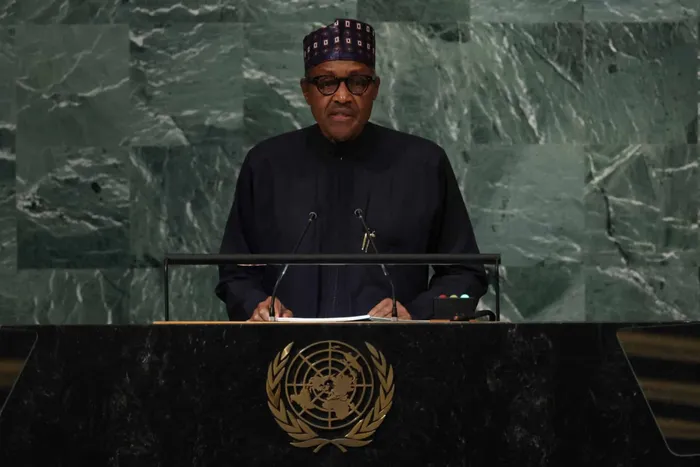The UN must listen: African leaders have spoken their truth

Picture: REUTERS/Brendan Mcdermid – Nigeria’s President Muhammadu Buhari addresses the 77th Session of the United Nations General Assembly at the United Nations headquarters, New York City.
By Chad Williams
To become an effective organisation in Africa, United Nations (UN) leaders need to take note of what African leaders are saying when they take the podium at events such as the special sittings of the UN General Assembly.
Africa remains front and centre in the work of the UN, whether in the human rights area, the humanitarian domain, the development arena, or especially in the field of peace and security, according to a note on the UN.
But for Africa to become an influential game player on the global stage, Western leaders need to take a step back, listen to African leaders, and allow for African responses to crises.
For example, Africa plays a huge role as a global leader for not only continental and regional crises, but for global issues as well – we’ve seen it during the Covid-19 pandemic.
Some of Africa’s finest scientists, researchers and professors led Africa’s response in the latter days of the global health crisis, which saw the world looking to Africa for solutions, because we have some of the finest minds.
So what is UNGA and why is it important for Africa?
If you’re unsure what the UN General Assembly’s (UNGA’s) role is in the world, they’re essentially the main policy-making organ of the Organisation.
Comprising all member states, it provides a unique forum for multilateral discussion of the full spectrum of international issues covered by the Charter of the United Nations. Each of the 193 member states of the United Nations has an equal vote.
The UN General Assembly (UNGA 77) officially kicked off last week, as the United Kingdom bid farewell to the Queen of England, pretty symbolic if you ask me.
African leaders are well-poised to show a firm, united front, showing the rest of the world leaders that Africa has not only suitable solutions to world crises, but also can play a major role in solving global problems.
What we saw at UNGA 77, was African leaders speaking their truth and calling for change to some of the world’s and the continent’s most pressing issues.
As African leaders spoke in one voice calling for economic sanctions to be dismantled against Zimbabwe, growing food insecurity and energy issues and climate change effects, African leaders spoke out about issues that are ravaging people the world over, during a time when divisive and collective leadership is required now more than ever.
Constraints on Russian oil and gas have ignited the search for new supplies in Africa, the most unexplored region globally, writes the ISS’ Jakkie Cilliers, Head of African Futures & Innovation, ISS Pretoria.
Tensions in Ukraine were generating growing interest in the country’s gas reserves – the sixth-largest in Africa.
African Union (AU) chairperson and Senegalese President Macky Sall led the charge when he delivered his address at the UNGA 77th session on Tuesday, where he said the sanctions should be removed immediately to enable Zimbabwe to realise its full potential.
Around the world, regional approaches have successfully improved human security, says Dr Richard Munang is UNEP’s Africa Regional Climate Change Programme Coordinator.
For example, through cross-border collaboration, security issues related to water quality, fishery and flooding were greatly improved in Rhine River in Europe and similarly, water security was greatly improved in Lake Uromiyeh in Iran. Also the SARS and avian flu pandemics were fought jointly in the Asia region.
Africa is poised to be the youngest continent in the next 30 years. We have solid, a little shaky, but solid response plans to health outbreaks, make African’s leaders in pandemic response in my opinion.
On Climate Change, the latest decadal predictions, covering the five-year period from 2020 to 2024, shows continued warming and decreasing rainfall especially over North and Southern Africa, and increased rainfall over the Sahel.
This is serious, and requires a global, African-led response and solution to a crisis that is set to hurt the region worse than any other region.
Political leaders on Thursday highlighted the impact of climate change and called for collective action in their speeches to the General Debate of the UN General Assembly.
Africa is known as having the largest reserve of rare earth that is badly needed for “green” technologies. It is therefore undeniable that Africa is part of the global climate solution according to the UN.
Williams is a multimedia journalist with the African News Agency (ANA).
This article is original to the The African. To republish, see terms and conditions.